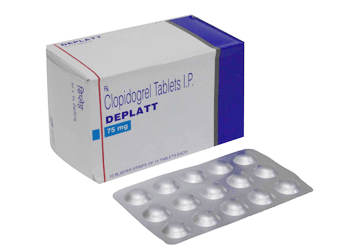Plavix (Clopidogrel)
Plavix is a blood thinner that is used to prevent heart attacks and strokes in people who have had a recent heart attack, stroke, or blood circulation problem. It is also used in conjunction with aspirin to treat new or worsening chest pain (new heart attack, unstable angina), as well as to keep blood arteries open and prevent blood clots during specific procedures (such as a cardiac stent). Plavix has Clopidogrel which acts by preventing platelets from adhering together and producing dangerous clots. It's an antiplatelet medication. It aids in the smooth flow of blood throughout the body.

*Product image is for reference only
Brand Choices

 Prescription Required
Prescription Required

 Prescription Required
Prescription Required
Generic Alternatives

 Prescription Required
Prescription Required

 Prescription Required
Prescription Required

 Prescription Required
Prescription Required

 Prescription Required
Prescription Required

 Prescription Required
Prescription Required

 Prescription Required
Prescription Required
Brand Choices

 Prescription Required
Prescription Required

 Prescription Required
Prescription Required
Generic Alternatives

 Prescription Required
Prescription Required

 Prescription Required
Prescription Required

 Prescription Required
Prescription Required

 Prescription Required
Prescription Required
Brand Choices
Generic Alternatives

 Prescription Required
Prescription Required

 Prescription Required
Prescription Required
Plavix (Clopidogrel) Medication Information:
What is Plavix (Clopidogrel) ?
Zetia ( Ezetimibe) is a prescription drug that is an antiplatelet medication. It aids in the smooth flow of blood throughout your body.
What is Plavix (Clopidogrel) used for?
Clopidogrel is a blood thinner that is used to prevent heart attacks and strokes in those who have had a recent heart attack, stroke, or blood circulation problem (peripheral vascular disease).
It's also used in conjunction with aspirin to treat new or worsening chest pain (new heart attack, unstable angina), as well as to keep blood arteries open and prevent blood clots during specific procedures (such as a cardiac stent). Clopidogrel acts by preventing platelets from adhering together and producing dangerous clots.
How does Plavix work?
It is an antiplatelet drug (blood thinner) that minimizes the danger of harmful blood clots forming in blood arteries throughout the body. It is also known as a platelet aggregation inhibitor. Plavix stops or prevents excessive bleeding by attaching to platelets, which are little blood cells that adhere together.
Direction:
How to take Plavix (Clopidogrel) ?
It is an oral tablet that is taken by mouth with or without food. Do not crush, chew, break, or open the capsule; instead, swallow it whole. It is available as capsules and tablets and must be given in combination with other medications.
What is the different dosage available?
Is available as an oral tablet of 75mg, 150mg, and 300mg.
What is the recommended dosage?
The recommended dosage of Plavix (Clopidogrel) is 300mg taken as a single dose initially then, a maintenance dose of 75mg once a day is administered orally usually once daily with or without food.
What is the maximum dosage?
The maximum dosage for the medicine in adults is 162-325mg which can be used along with other medications. Dosage is adjusted based on the weight and health conditions of an individual.
What if you forget to give a dose?
As soon as you recollect, take the missed dose. If the next dose is approaching, skip the missing dose and return to your regular dosing plan. To make up for a missing dose, do not take a double dose.
Plavix Precautions:
What should you know about Plavix (Clopidogrel) before you start taking it?
You should not take Plavix if you have any liver disease, kidney disease, or any other bleeding ulcers, bleeding sores, etc. Inform your doctor if you are planning to undergo or have undergone any surgery. The medication should be stopped 5 days before the surgery. Inform your doctor if you are pregnant or breastfeeding before starting Zetia.
Plavix Side Effects:
What are the side effects of Plavix (Clopidogrel)?
One can experience easy bleeding/bruising, stomach upset/pain, diarrhea, and constipation as some of the common side effects. Many people using this medication do not have serious side effects. Plavix can also cause a significant blood problem in certain people.
Symptoms can occur at any point after you start taking this drug. If any of the symptoms like severe stomach/abdominal discomfort, uncontrollable gum or nose bleeding, bloody/black feces, disorientation, fever, extreme skin paleness, purple skin patches, or fainting appear, get medical attention straight away.
Plavix Interactions:
Does this medication interact with other drugs, foods, or alcohol?
If you're currently taking aspirin, talk to your doctor about whether you should keep taking it or stop taking it while taking this drug for your specific illness (aspirin and clopidogrel may be used in combination after a coronary stent procedure, or for some heart conditions). Consult your doctor before starting aspirin for any medical issue if you haven't already.
Storage:
How should this medication be stored?
Plavix (Clopidogrel) should be stored at room temperature (15ºC-30ºC)away from light, heat, moisture, and reach of the children.
Other Important Information:
- Make sure no one else uses this medication without any prescription.
- The chances of treatment failure grow when dosages are skipped. Make sure you take all of your medications at the same time.
- Inform your doctor about all of your medical conditions, including any allergies or pregnancy, or breastfeeding.
- Don't increase your dose, take this drug more often than prescribed, or stop taking it for even a short time without your doctor's permission.
FAQs:
Can Plavix (Clopidogrel) be taken alone?
Plavix (Clopidogrel) is a blood thinner that is used alone or in combination with aspirin to prevent serious or life-threatening heart and blood vessel issues in persons who have had a stroke, a heart attack, or significant chest discomfort.
How long does Plavix take to take effect?
Plavix can start working in as little as two to 24 hours. After three to seven days of daily use, it establishes a stable state in the body. After discontinuing Plavix, the body's blood clotting function returns to normal in around five days.
How can I quit taking Plavix without harming myself?
You should only stop taking Plavix if your healthcare provider advises you to. Stopping abruptly increases the risk of blood clots.
Can Plavix (Clopidogrel) take on an empty stomach?
Plavix (Clopidogrel) can be recommended to take with or without food.










